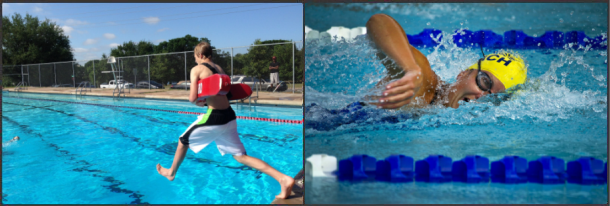Survival float or deadman float enables you to float above water for an extended time whilst also saving your energy. To be able to float, the main key is to try and stay relaxed.
How to float
Critical factors for being able to float would be:
– to be as relaxed as possible
– knees bent a bit
– arms in a comfortable position

Basically, finding a position where you feel most relaxed. You will start sinking as soon as you tense up even a bit. This will be because your muscles will be activated, and muscles are denser than water and thus will bring you to sink in water.
Stay relaxed
The general rule is that staying relaxed in the water is pretty important. As mentioned previously, tensing up will only bring you to a sink. More interestingly, the muscles in your stomach are the muscles which will cause you to sink.
When people tense up, most commonly, the muscles in your stomach will also tense up. This causes the diaphragm to move downwards, and thus the centre of buoyancy is shifted.
Panicking and waving arms or legs about will only bring energy loss. As soon as you recognize that you can easily stay afloat in the water, you will be more relaxed.
What to do if you are panicking
Panicking in water is very understandable. Your brain thinks you are in danger, and thus, the fight or flight instinct kicks in, resulting in panic.

It will most commonly cause shortness of breath.
This is a scary feeling, especially when in water with nothing to hold onto an insight, to be able to ground yourself. Your body will try to find a solution, and it tries to find the solution by kicking about. Although this is an instinct, it is important to try calming yourself down by telling yourself you are okay and will not sink.
To signal the body you are calm; you have to breathe
– Try and concentrate on your breath
– Take a deep inhale and exhale
– Counting to 10 will also help distract your body from the initial feeling of panic
Some swimmers will sing a song to themselves or recite a certain line to distract themselves.
The panic will pass
It is important to remember that this feeling will pass. The panic results from a burst of adrenaline, especially when the body is submerged in a cold body of water.
Rhythmic breathing and easing into swimming with a slow stroke will ease your mind and body.

Deadman float
The deadman float is recommended if you`re in water for an extended time. This technique will save you the most amount of energy.
1. Let your body go limp
2. Face down into the water
3. Hold your breath
4. Raise your head slowly now and then for some air

Keep your lungs filled with air.
Try not to exhale all the air out of your lungs completely. The air in your lungs will enable you to float easier in water.
The physics of this principle is that a full lung increases body volume, the aggregate density is lowered, and thus the buoyancy is improved – you float better.
In conclusion, if you are ever trying to survive in water and do not know how to swim, your best option is to float. Try to keep calm and control your breath to not cause any exhaustion.
Stay safe!
Lifeguard Services
Lifeguard services provide an easy way to hire a fully qualified lifeguard for permanent, short and long-term hire. We provide an easy way to make sure your allocated water is in safe hands. We can come to your school, outdoor event, party and more. To find out more and book please see our booking page.




Leave a Reply